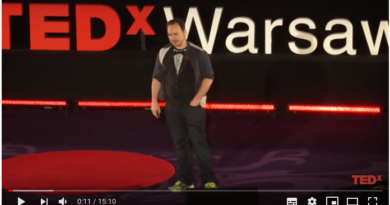Crédito da Imagem: krakenimages on Unsplash
Neste video do canal 5 Minute Language, Agnieska Murdoch nos mostra alguns erros muito comuns que estrangeiros fazem ao falar inglês. Ela explica a razão destes erros e também como corrigí-los.
| Audio | |
|---|---|
Normal | Slow |
| English Transcript | Tradução |
| Hi everyone, it's Agnieszka Murdoch from "Five Minute Language". | Olá a todos, eu sou Agnieszka Murdoch do canal "Five Minute Language". |
| Welcome to my channel, make sure you subscribe if you haven't already and give this video a thumbs up, I really appreciate it. | Bem-vindo ao meu canal, certifique-se de se inscrever, caso ainda não o tenha feito, e dê um like neste vídeo, agradeço muito. |
| If you're new here, this channel is all about sharing tips on learning English and learning other foreign languages in general. | Se você é novo por aqui, este canal é para compartilhar dicas sobre como aprender inglês e outras línguas estrangeiras em geral. |
| So, make sure you subscribe and also if you found me on tik tok, let me know in the comments below. | Então, certifique-se de se inscrever e também se você me encontrou no Tik Tok, me avise nos comentários abaixo. |
| So this video is about the most common mistakes that English learners make and I'm also going to tell you how to fix them. | Este vídeo é sobre os erros mais comuns que os alunos de inglês cometem e também vou falar sobre como corrigi-los. |
| So, let's get started. | Então vamos começar. |
| So the first mistake that I often hear English learners make is not knowing how to use the present perfect correctly. | O primeiro erro que freqüentemente ouço alunos de inglês cometerem é não saber como usar o presente perfeito corretamente. |
| So sometimes learners use it when they're not supposed to use it and sometimes when they are supposed to use it, they don't use it. | Por isso, às vezes os alunos usam quando não deveriam usá-lo e às vezes, quando deveriam usá-lo, eles não o usam. |
| So an example of that is for example when people say "I live in London since 2012". | Um exemplo disso é, por exemplo, quando as pessoas dizem "I live in London since 2021". |
| They often use the present simple tense but actually what you need here is the present perfect. | Eles costumam usar o presente simples, mas na verdade o que você precisa aqui é o presente perfeito. |
| When you talk about something that started in the past and is also true in the present, you need to use the present perfect. | Quando você fala sobre algo que começou no passado e também é verdadeiro no presente, você precisa usar o presente perfeito. |
| So the correct version of this sentence will be "I have lived in London since 2012". | Portanto, a versão correta desta frase será "I have lived in London since 2021." |
| Another mistake that I often hear English learners make is when they talk about something that happened in the past but that also has consequences in the present. | Outro erro que freqüentemente ouço alunos de inglês cometerem é quando falam sobre algo que aconteceu no passado, mas que também tem consequências no presente. |
| So for example the question "Did you sprain your ankle?" | Por exemplo, a pergunta "Did you sprain your ankle?" |
| If somebody's ankle is currently sprained, then you should use the present perfect because you're talking about an action that happened in the past but also has consequences in the present. | Se o tornozelo de alguém está torcido, então você deve usar o presente perfeito porque está falando sobre uma ação que aconteceu no passado, mas também tem consequências no presente. |
| So you should say "Have you sprained your ankle?" | Então você deve dizer "Have you sprained your ankle?" |
| Another mistake I often hear people make is confusing "a" and "the". | Outro erro que sempre ouço as pessoas cometem é confundir "a" e "the". |
| So the indefinite article and the definite article. | Portanto, o artigo indefinido e o artigo definido. |
| So the indefinite article should be used when you're talking about something that isn't specific. | O artigo indefinido deve ser usado quando você estiver falando sobre algo que não é específico. |
| So for example, "Could you pass me an apple?" | Por exemplo, "Could you pass me an apple?" |
| I want any apple, I don't want a particular apple, just any apple. | Eu quero qualquer maçã, não quero uma maçã em particular, apenas qualquer maçã. |
| If I say I want the apple, then I mean I want this specific apple, maybe the apple that I put on the table. | Se digo que quero a maçã, quero dizer que quero esta maçã específica, talvez a maçã que coloquei na mesa. |
| Okay, the third mistake I often hear people make is ignoring phrasal verbs. | Ok, o terceiro erro que costumo ouvir as pessoas cometem é ignorar os verbos frasais. |
| So often people will learn English they will learn lots of vocabulary, lots of verbs and and nouns and adjectives, but they will ignore phrasal verbs because phrasal verbs are quite overwhelming. | Freqüentemente, as pessoas aprenderão inglês, aprenderão muito vocabulário, muitos verbos e substantivos e adjetivos, mas ignorarão os verbos frasais porque os verbos frasais são bastante difíceis. |
| There are so many of them and there are so many different variants of the same verb using different prepositions. | Existem tantos deles e existem tantas variantes diferentes do mesmo verbo usando diferentes preposições. |
| So it's quite confusing and they are quite difficult to memorize. | Portanto, é muito confuso e difícil de memorizar. |
| But actually native speakers use phrasal verbs all the time and the more phrasal verbs you use, the more fluent and native you will sound. | Mas, na verdade, os falantes nativos usam verbos frasais o tempo todo e quanto mais verbos frasais você usar, mais fluente e nativo você soará. |
| So I definitely recommend that you spend a good amount of time on learning phrasal verbs every week. | Portanto, definitivamente recomendo que você gaste uma boa quantidade de tempo aprendendo verbos frasais todas as semanas. |
| I have two courses which you can check out in the description box, that teach you phrasal verbs. | Eu tenho dois cursos que você pode conferir na caixa de descrição, que ensinam verbos frasais. |
| So the first course is for intermediate learners. | O primeiro curso é para alunos intermediários. |
| It teaches you the 100 most essential phrasal verbs and another course which is for advanced learners, that teaches you 100 advanced phrasal verbs. | Ele ensina os 100 verbos frasais mais essenciais e outro curso para alunos avançados, que ensina 100 verbos frasais avançados. |
| So make sure you check them out, okay? | Portanto, certifique-se de dar uma olhada, certo? |
| The fourth mistake is using the past perfect tense unnecessarily. | O quarto erro é usar o pretérito perfeito desnecessariamente. |
| So sometimes when talking about a series of events English learners will want to use the past perfect to show that one action happened first and it was followed by another action. | Portanto, às vezes, ao falar sobre uma série de eventos, os alunos de inglês vão querer usar o passado perfeito para mostrar que uma ação aconteceu primeiro e foi seguida por outra ação. |
| So for example, "I had gone shopping and then I went home." | Por exemplo, "I had gone shopping and then I went home." |
| So often people will say that because they want to indicate that going shopping happened first but actually you don't need to do that, because it's clear from context that you went shopping first and then you went home. | Freqüentemente, as pessoas dizem isso porque querem indicar que as compras aconteceram primeiro, mas na verdade você não precisa fazer isso, porque fica claro pelo contexto que você foi às compras primeiro e depois voltou para casa. |
| So you only need to say "I went shopping and then I went home" because it's clear what happened first and what happened next. | Portanto, você só precisa dizer "I went shopping and then I went home" porque está claro o que aconteceu primeiro e o que aconteceu depois. |
| You can use the past perfect if it's not clear from context. | Você pode usar o passado perfeito se não estiver claro no contexto. |
| So for example, "I had already done my shopping when you arrived." | Por exemplo, "I had already done my shopping when you arrived." |
| You need that because you need to indicate that the action of doing shopping had already happened in the past before the person arrived, okay? | Você precisa disso porque precisa indicar que a ação de fazer compras já havia acontecido no passado antes de a pessoa chegar, ok? |
| And the final mistake that I often hear people make, is using the wrong preposition with different verbs. | E o erro final que sempre ouço as pessoas cometerem é usar a preposição errada com verbos diferentes. |
| So often each verb will go with a different preposition, depending on what you're talking about. | Freqüentemente, cada verbo terá uma preposição diferente, dependendo do que você está falando. |
| And I'm not talking about phrasal verbs, I'm just talking about standard verbs. | E não estou falando de verbos frasais, estou falando apenas de verbos padrão. |
| So for example, when using the verb "arrive" many people make the mistake of using the preposition "to". | Então, por exemplo, ao usar o verbo "arrive" muitas pessoas cometem o erro de usar a preposição "to". |
| For example, "I arrived to London" because that's the exact translation from many languages, but actually what you need to say is "I arrived in London." | Por exemplo, "I arrived to London" porque essa é a tradução exata de muitos idiomas, mas na verdade o que você precisa dizer é "I arrived in London." |
| Similarly, when using the verb "depend" many people make the mistake of saying "to depend from something" instead of "to depend on something" and that's again because in many languages that is the phrase that they're translating directly into English. | Da mesma forma, ao usar o verbo "depend" muitas pessoas cometem o erro de dizer "to depend from something" em vez de "to depend on something" e isso é novamente porque em muitas línguas essa é a frase que eles traduzem diretamente para o inglês. |
| So remember that when learning verbs you also need to look at different prepositions that they go with, and look at examples of sentences that contain those verbs and prepositions as well. | Portanto, lembre-se de que, ao aprender verbos, você também precisa olhar para as diferentes preposições com as quais eles são usados e olhar para exemplos de sentenças que contêm esses verbos e preposições também. |
| So I hope you enjoyed this video, make sure you subscribe to my channel, check out my courses in the description box below and follow me on Tik Tok as well for short fun videos with English learning tips and I'll see you next time. | Espero que tenham gostado desse vídeo, certifique-se de se inscrever no meu canal, confira meus cursos na caixa de descrição abaixo e siga-me no Tik Tok também para vídeos curtos e divertidos com dicas de aprendizado de inglês e até a próxima. |
| Bye! | Tchau! |
Contagem de palavras
A tabela abaixo exibe as palavras encontradas neste vídeo bem como o número de vezes em que aparecem.
Veja também: Para que serve esta tabela?
| Freq. | Palavra | Freq. | Palavra | Freq. | Palavra |
|---|---|---|---|---|---|
| 48 | the | 34 | you | 28 | so |
| 28 | and | 26 | that | 25 | I |
| 21 | to | 16 | is | 15 | verbs |
| 15 | in | 13 | of | 12 | use |
| 12 | make | 11 | when | 10 | phrasal |
| 10 | for | 10 | about | 9 | they |
| 9 | often | 8 | will | 8 | present |
| 8 | people | 8 | need | 8 | mistake |
| 8 | example | 8 | english | 8 | because |
| 7 | perfect | 7 | past | 7 | on |
| 7 | learners | 7 | it | 7 | happened |
| 7 | but | 7 | apple | 6 | want |
| 6 | using | 6 | this | 6 | talking |
| 6 | shopping | 6 | say | 6 | many |
| 6 | if | 6 | first | 6 | also |
| 6 | a | 5 | what | 5 | went |
| 5 | then | 5 | something | 5 | learning |
| 5 | it's | 5 | hear | 5 | from |
| 5 | different | 5 | are | 4 | you're |
| 4 | with | 4 | verb | 4 | sure |
| 4 | not | 4 | my | 4 | me |
| 4 | london | 4 | arrived | 4 | another |
| 4 | actually | 4 | action | 3 | video |
| 3 | time | 3 | them | 3 | talk |
| 3 | subscribe | 3 | sometimes | 3 | should |
| 3 | quite | 3 | prepositions | 3 | preposition |
| 3 | out | 3 | okay | 3 | languages |
| 3 | I'm | 3 | home | 3 | have |
| 3 | had | 3 | don't | 3 | depend |
| 3 | clear | 3 | check | 3 | channel |
| 3 | article | 3 | ankle | 3 | an |
| 3 | already | 2 | your | 2 | which |
| 2 | well | 2 | tips | 2 | they're |
| 2 | there | 2 | that's | 2 | tense |
| 2 | teaches | 2 | supposed | 2 | started |
| 2 | sprained | 2 | specific | 2 | since |
| 2 | next | 2 | native | 2 | most |
| 2 | more | 2 | lots | 2 | look |
| 2 | learn | 2 | just | 2 | indicate |
| 2 | indefinite | 2 | how | 2 | here |
| 2 | has | 2 | going | 2 | go |
| 2 | description | 2 | courses | 2 | course |
| 2 | context | 2 | consequences | 2 | confusing |
| 2 | can | 2 | box | 2 | below |
| 2 | be | 2 | at | 2 | as |
| 2 | any | 2 | all | 2 | advanced |
| 1 | wrong | 1 | welcome | 1 | week |
| 1 | was | 1 | vocabulary | 1 | videos |
| 1 | version | 1 | variants | 1 | used |
| 1 | up | 1 | unnecessarily | 1 | two |
| 1 | true | 1 | translation | 1 | translating |
| 1 | tok | 1 | tik | 1 | thumbs |
| 1 | those | 1 | third | 1 | tell |
| 1 | tech | 1 | teach | 1 | table |
| 1 | standard | 1 | sprain | 1 | spend |
| 1 | speakers | 1 | sound | 1 | somebody's |
| 1 | simple | 1 | similarly | 1 | show |
| 1 | short | 1 | sharing | 1 | series |
| 1 | sentences | 1 | sentence | 1 | see |
| 1 | saying | 1 | same | 1 | remember |
| 1 | recommend | 1 | really | 1 | question |
| 1 | put | 1 | phrase | 1 | person |
| 1 | pass | 1 | particular | 1 | overwhelming |
| 1 | other | 1 | only | 1 | one |
| 1 | nouns | 1 | new | 1 | murdoch |
| 1 | mistakes | 1 | minute | 1 | memorize |
| 1 | mean | 1 | maybe | 1 | lived |
| 1 | live | 1 | let's | 1 | let |
| 1 | language | 1 | knowing | 1 | know |
| 1 | isn't | 1 | into | 1 | intermediate |
| 1 | instead | 1 | I'll | 1 | ignoring |
| 1 | ignore | 1 | hope | 1 | hi |
| 1 | haven't | 1 | good | 1 | gone |
| 1 | give | 1 | get | 1 | general |
| 1 | fun | 1 | fourth | 1 | found |
| 1 | foreign | 1 | followed | 1 | follow |
| 1 | fluent | 1 | fix | 1 | five |
| 1 | final | 1 | examples | 1 | exact |
| 1 | everyone | 1 | every | 1 | events |
| 1 | essential | 1 | enjoyed | 1 | each |
| 1 | done | 1 | doing | 1 | do |
| 1 | directly | 1 | difficult | 1 | did |
| 1 | depending | 1 | definitely | 1 | definite |
| 1 | currently | 1 | could | 1 | correctly |
| 1 | correct | 1 | contain | 1 | common |
| 1 | comments | 1 | bye | 1 | by |
| 1 | before | 1 | arrive | 1 | appreciate |
| 1 | amount | 1 | agnieszka | 1 | again |
| 1 | adjectives |









